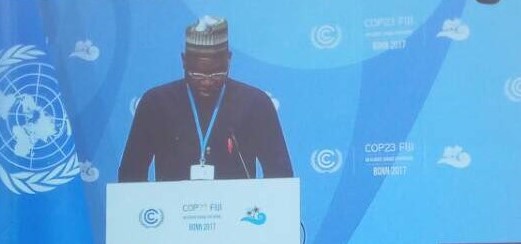To ensure the timely implementation of its Nationally Determined Contributions (NDC), Nigeria says it has developed a robust National Sectoral Action Plan across the five priority sectors, which are: agriculture, energy, transportation, industry and oil & gas.

The West African nation added that it had also embraced issuance of green bond, ostensibly as an alternative source of funding green projects that would reduce emissions and provide robust climate infrastructure needed in the country.
The submission formed part of the Nigerian National Statement delivered by the Environment Minister of State and Head of Delegation, Ibrahim Usman Jibril, on Thursday, November 16, 2017 at the 23rd Session of the Conference of the Parties (COP23) to the United Nations Framework Convention on Climate Change holding in Bonn, Germany.
The minister added that this would also manifest in renewable energy, low carbon transport, water infrastructure and sustainable agriculture. He disclosed that Nigeria would launch the first “Sovereign Green Bonds” in Africa in the coming weeks.
“Similarly, we will continue to show a profound interest in contributing to effective global action on climate change,” he said, adding that science has proved beyond reasonable doubt the certainty of the phenomenon.
“So, we must stand united to ensure that the outcome of this Conference comprehensively address what we need to do as prescribed by the Paris Agreement to deal with fundamental challenges of climate change. We are prepared to work with all Parties, in the spirit of collaboration and cooperation with a view to achieving the outcome that will be universally agreeable and beneficial to mankind of all generations,” said the minister.
According to him, up-scaling funding to address the impacts of climate change on livelihoods and ecosystems through an over-arching financial architecture to finance adaptation and mitigation measures is of high priority to Nigeria.
“This should include implementing the gender action plan under the Lima Work Programme on Gender,” he stated, adding that Nigeria is firmly committed to seeing that current areas of contentions with respect to the financial mechanism, adaptation framework and institutional arrangements, technology transfer and capacity building are resolved to the benefit of all Parties.
“We need to urgently move to remove barriers that impede developing countries from effectively accessing global climate finance such as the Adaptation Fund, and the Green Climate Change Fund (GCF), amongst others,” declared the minister.
We called for a focused session that would, according to him, make substantive progress through constructive discussions across all areas of the Paris Agreement work programme “in a balanced manner to enable us come up with a first-hand information on the implementation guidelines of the Paris Agreement well ahead of the 2018 Session including accelerating the implementation of the pre-2020 commitments and actions and increasing the pre-2020 ambition in accordance with paragraphs 3 and 4 of decision 1/CP.19.”
He added: “We welcome the ‘Talanoa Dialogue’ and seek your guidance and direction as we proceed in the spirit of collaboration and trust in line with the Paris Agreement. This will lead us collectively to a common ground for a successful 2018 facilitative dialogue. Nigeria also shares the same circumstance and views with African member states in terms of NDC implementation capacities.
“We are not in any way proposing to re-open the land mark Agreement but we support the call from the African member States that the best way to proceed is to show a demonstration of flexibility for African countries on climate change actions based on the principles and provisions of the convention and to ensure that differentiation is clearly reflected.”
